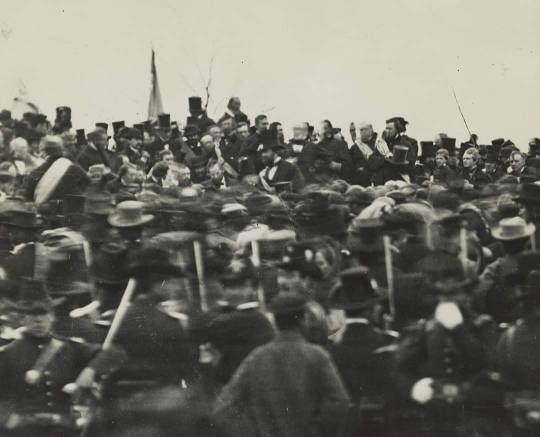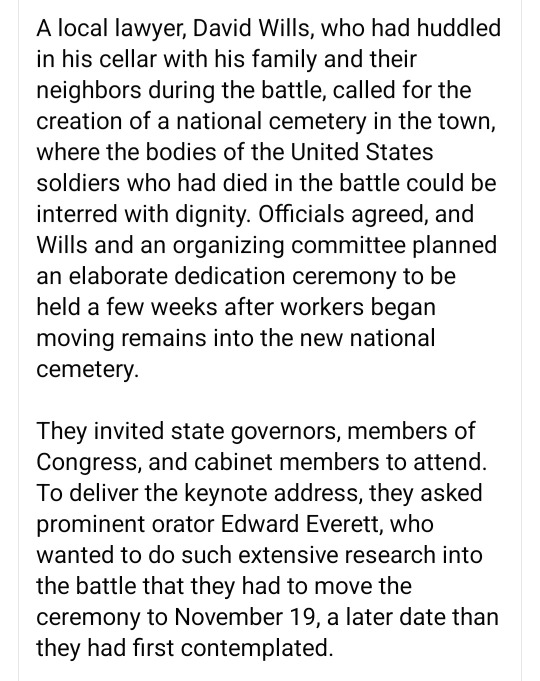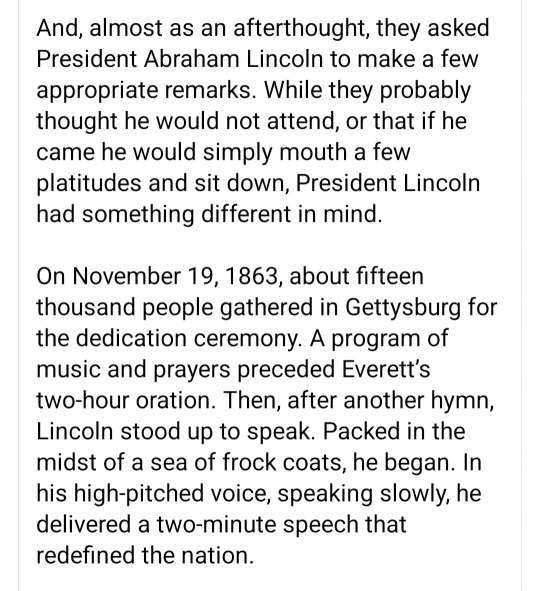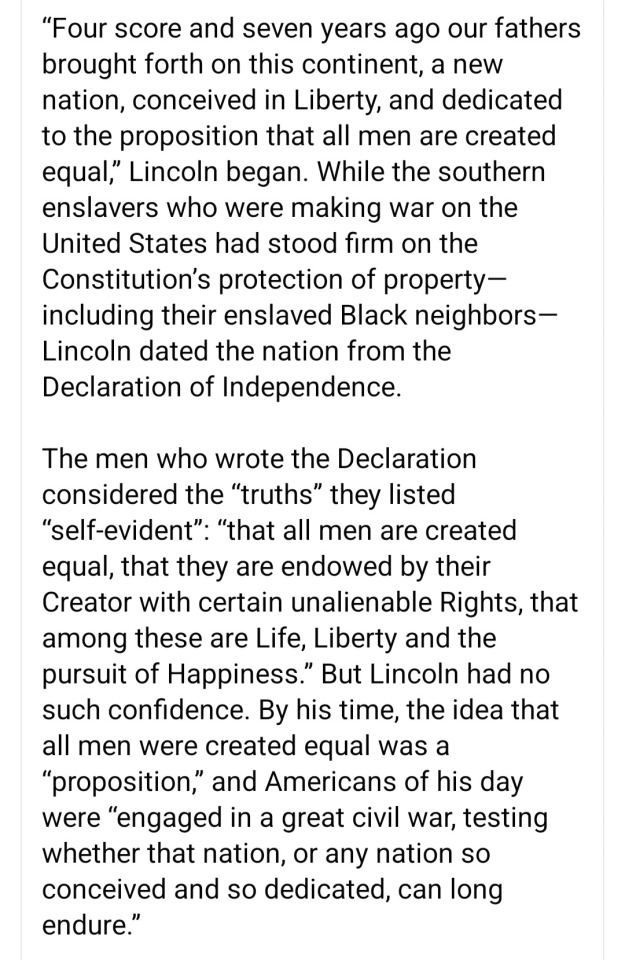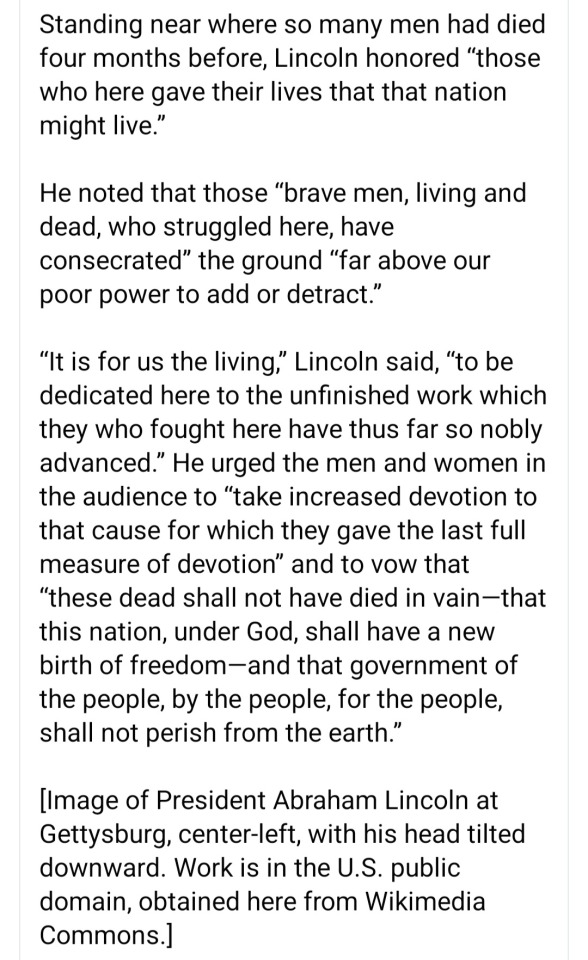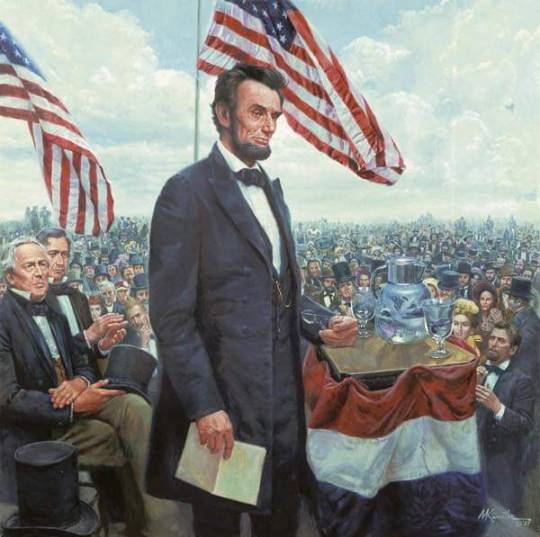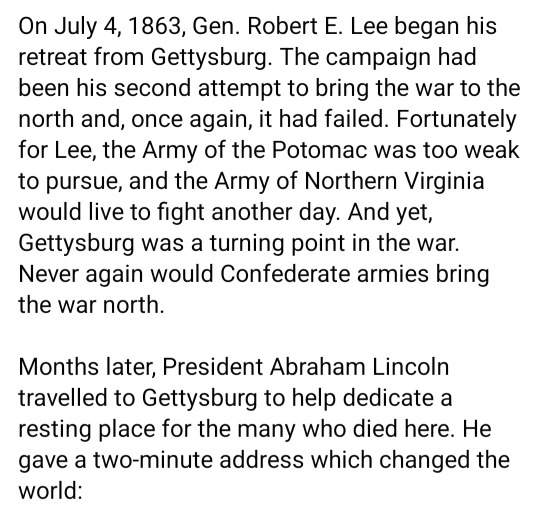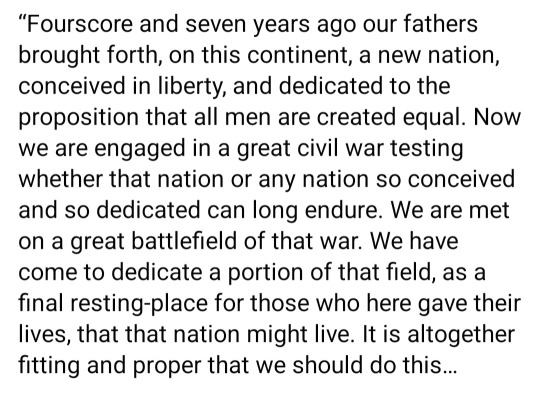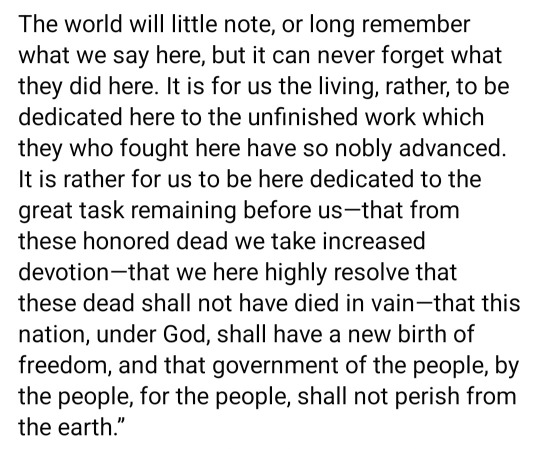#gettysburg address
Text
On November 19, 1863, at the dedication of a military cemetery at Gettysburg, Pennsylvania, during the American Civil War, President Abraham Lincoln delivers one of the most memorable speeches in American history. #OnThisDay
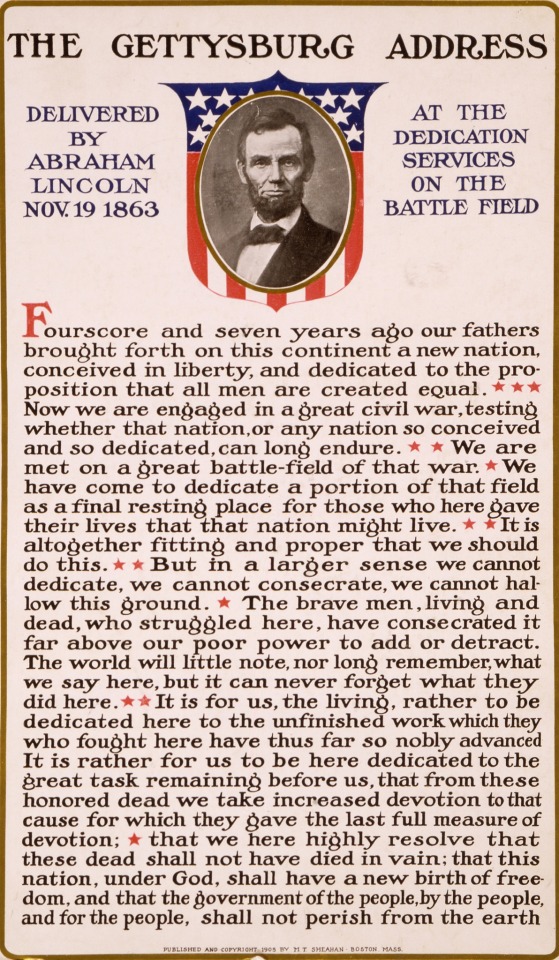
432 notes
·
View notes
Text
...That we here highly resolve that these dead shall not have died in vain...
One hundred and sixty years ago today, on November 19, 1863, President Abraham Lincoln traveled to the Civil War battlefield in Gettysburg, Pennsylvania, to participate in the dedication of a Union war cemetery. He had been invited as an afterthought—the keynote speaker, Edward Everett of Massachusetts, spoke for two hours before the President took the podium. President Lincoln spoke for less than two minutes. The speech was so short that the photographer who had planned to take a picture of Lincoln giving the address was only able to take the photograph as the President returned to his seat. Everett later wrote a letter to Lincoln saying that, "I wish that I could flatter myself that I had come as near to the central idea of the occasion in two hours as you did in two minutes."
#gettysburg address#gettysburg national cemetery#civil war#president of the united states#abraham lincoln#video#repost
9 notes
·
View notes
Photo
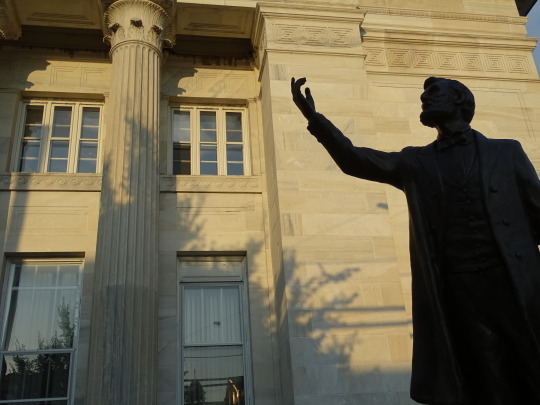




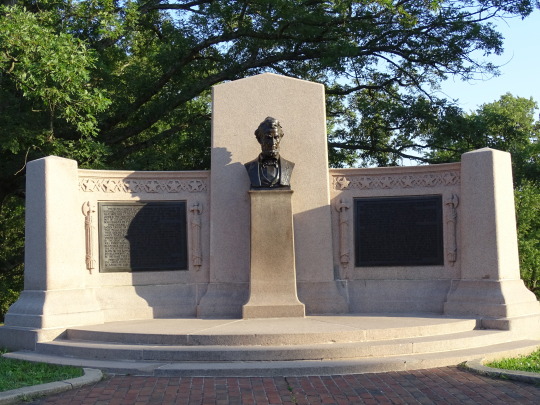
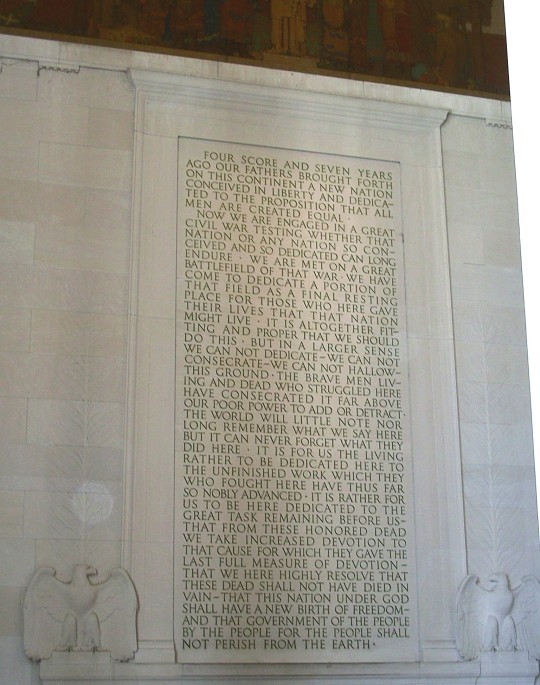



American Civil War: U.S. President Abraham Lincoln delivered the Gettysburg Address at the dedication ceremony for the military cemetery at Gettysburg, Pennsylvania on November 19, 1863.
#President Abraham Lincoln by Stanley J. Watts#American Civil War#vacation#Gettysburg National Military Park#Gettysburg Address#19 November 1963#Gettysburg Battlefield Historic District#anniversary#US history#travel#USA#original photography#Lincoln’s Gettysburg Address Memorial#US Civil War#Gettysburg National Cemetery#Soldiers' National Monument#Washington DC#Lincoln Memorial#US president#Daniel Chester French#tourist attraction#landmark
7 notes
·
View notes
Photo
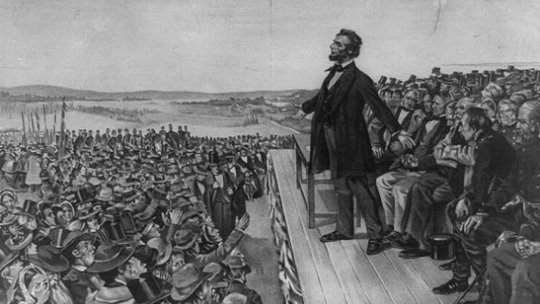
LETTERS FROM AN AMERICAN
November 19, 2022
Heather Cox Richardson
For three hot days, from July 1 to July 3, 1863, more than 150,000 soldiers from the armies of the United States of America and the Confederate States of America slashed at each other in the hills and through the fields around Gettysburg, Pennsylvania.
When the battered armies limped out of town after the brutal battle, they left scattered behind them more than seven thousand corpses in a town with fewer than 2500 inhabitants. With the heat of a summer sun beating down, the townspeople had to get the dead soldiers into the ground as quickly as they possibly could, marking the hasty graves with nothing more than pencil on wooden boards.
A local lawyer, David Wills, who had huddled in his cellar with his family and their neighbors during the battle, called for the creation of a national cemetery in the town, where the bodies of the United States soldiers who had died in the battle could be interred with dignity. Officials agreed, and Wills and an organizing committee planned an elaborate dedication ceremony to be held a few weeks after workers began moving remains into the new national cemetery.
They invited state governors, members of Congress, and cabinet members to attend. To deliver the keynote address, they asked prominent orator Edward Everett, who wanted to do such extensive research into the battle that they had to move the ceremony to November 19, a later date than they had first contemplated.
And, almost as an afterthought, they asked President Abraham Lincoln to make a few appropriate remarks. While they probably thought he would not attend, or that if he came he would simply mouth a few platitudes and sit down, President Lincoln had something different in mind.
On November 19, 1863, about fifteen thousand people gathered in Gettysburg for the dedication ceremony. A program of music and prayers preceded Everett’s two-hour oration. Then, after another hymn, Lincoln stood up to speak. Packed in the midst of a sea of frock coats, he began. In his high-pitched voice, speaking slowly, he delivered a two-minute speech that redefined the nation.
“Four score and seven years ago our fathers brought forth on this continent, a new nation, conceived in Liberty, and dedicated to the proposition that all men are created equal,” Lincoln began.
While the southern enslavers who were making war on the United States had stood firm on the Constitution and said that its protection of property rights—including their enslavement of their Black neighbors— was the heart of the nation, Lincoln tied the country's meaning instead to the Declaration of Independence.
The men who wrote the Declaration considered the “truths” they listed “self-evident”: “that all men are created equal, that they are endowed by their Creator with certain unalienable Rights, that among these are Life, Liberty and the pursuit of Happiness.”
But Lincoln had no such confidence. By his time, the idea that all men were created equal was a “proposition,” and Americans of his day were “engaged in a great civil war, testing whether that nation, or any nation so conceived and so dedicated, can long endure.”
Standing near where so many men had died four months before, Lincoln honored “those who here gave their lives that that nation might live.” But he noted that those “brave men, living and dead, who struggled here, have consecrated” the ground “far above our poor power to add or detract.”
Instead, “[i]t is for us the living,” Lincoln said, “to be dedicated here to the unfinished work which they who fought here have thus far so nobly advanced.” He urged the men and women in the audience to “take increased devotion to that cause for which they gave the last full measure of devotion.”
In November 1863, after more than two years of deadly fighting, Lincoln rallied Americans not just behind the idea of freedom for Black Americans that he had declared the previous January with the Emancipation Proclamation, but also behind a new concept of America, one that would bring to life the ideas the founders had put in the Declaration but never brought to life: that all men are created equal, and that governments “derive... their just powers from the consent of the governed.”
Lincoln urged Americans “to here highly resolve that these dead shall not have died in vain -- that this nation, under God, shall have a new birth of freedom -- and that government of the people, by the people, for the people, shall not perish from the earth.”
—
Notes:
https://www.nps.gov/nr/travel/national_cemeteries/pennsylvania/gettysburg_national_cemetery.html
LETTERS FROM AN AMERICAN
HEATHER COX RICHARDSON
#history#political#Gettysburg#Civil War#Gettysburg Address#Lincoln#Heather Cox Richardson#Letters From An American
6 notes
·
View notes
Text
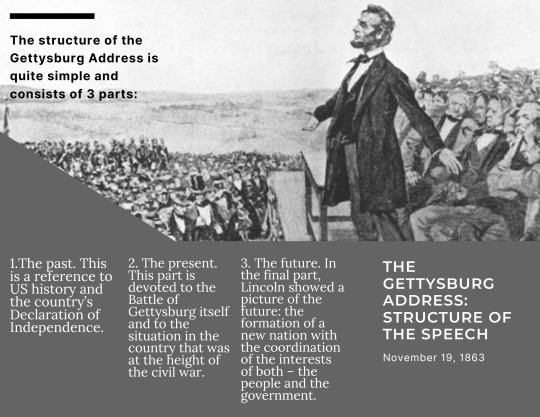
Rhetorical Analysis of Gettysburg Address.
3 notes
·
View notes
Text
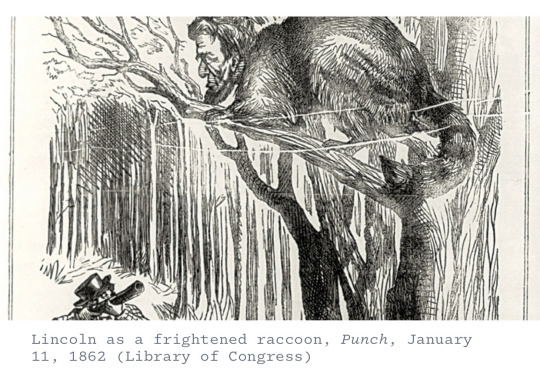
“We pass over the silly remarks of the president. For the credit of the nation we are willing that the veil of oblivion shall be dropped over them, and they shall be no more repeated or thought of.”
— A Pennsylvania newspaper reporting on the Gettysburg Address.
3 notes
·
View notes
Text
'Dimbulb' Trump Torched After Rambling Attempt To Explain Gettysburg Goes Wrong
Donald Trump’s attempt to explain the Battle of Gettysburg took some strange verbal detours ― and his critics were quick to call him out over it.
“Gettysburg, what an unbelievable battle that was. The Battle of Gettysburg,” the former president said at a rally in Pennsylvania on Saturday. “What an unbelievable, I mean it was so much, and so interesting, and so vicious and horrible, and so…
View On WordPress
0 notes
Link
#gettysburg#gettysburg address#abraham lincoln#abe lincoln#us civil war#battle of gettysburg#word cloud
0 notes
Text
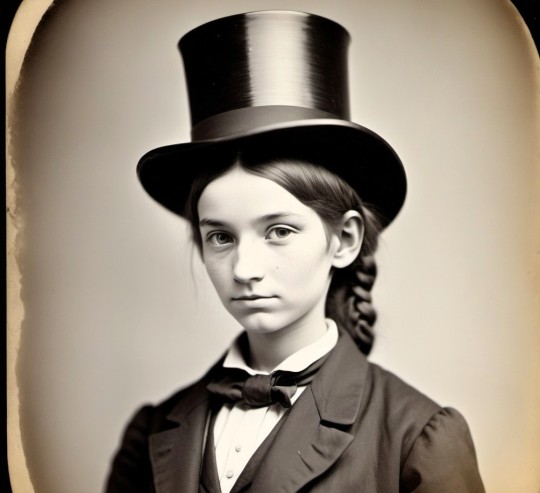
Alright, like, here we go with the Gettysburg address, ya know? So, like, four score and seven years ago, our dudes brought forth on this continent, like, a new nation, conceived in, like, liberty and dedicated to the proposition that all peeps are created equal, you feel me?
Now we're in this big battle scene, right? Testing whether that nation or any nation so chillaxed and stuff can, like, endure, you know? And we're all about this big battlefield, yo, which is pretty rad, right? Dedicated to like, the peeps who gave their all, and I mean, literally all, so this nation could keep on keepin' on, which is, like, super intense.
But, check this out, we can't forget what these peeps did, right? It's like, this whole vibe about honorin' them and staying true to what they fought for, you know what I'm sayin'? We gotta be all about this government by the peeps, for the peeps, so it's not like, gonna peace out anytime soon. That's like, the real deal.
And then, we gotta make sure all peeps stay tight with this freedom gig. Like, it's all about this new birth of freedom, where everyone's got their shot at life, liberty, and the pursuit of happiness. No exceptions, you dig?
So, we gotta be, like, totally dedicated to finishing what they started, right? Keep pushing for this whole freedom vibe and making sure this nation of ours stays on point. So that's what's up, you feel me? We gotta be all about that, like, government by the people, for the people, and not let it peace out, ever.
Mic drop.
0 notes
Text
"I could write shorter sermons, but once I start I get too lazy to stop.".

Abraham Lincoln was an American lawyer, politician, and statesman who served as the 16th president of the United States from 1861 until his assassination in 1865.
Born: 12 February 1809, Larue County, Kentucky, United States
Assassinated: 15 April 1865, Petersen House, Washington, D.C., United States
#Abraham Lincoln#16th President#American History#Civil War#Emancipation Proclamation#Gettysburg Address#Union Leader#Illinois#Assassination#Honest Abe#Great Emancipator#Republican Party#Leadership#Constitutional Law#The Lincoln-Douglas Debates#Presidential Legacy#Commander in Chief#Abolitionist#Illinois Lawyer#National Unity#quoteoftheday#today on tumblr
0 notes
Text
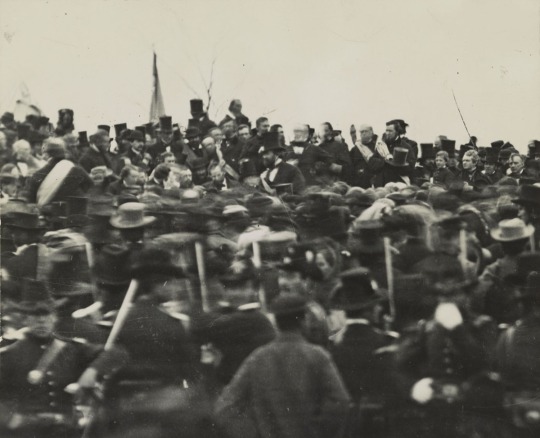
Where's Abraham? (Hatless in the center, Lincoln delivers his famous Gettysburg Address)
November 19, 1863 — The Gettysburg Address, in which President Abraham Lincoln spoke of all men being created equal and “government of the people, by the people, for the people” was delivered on this day.
Four score and seven years ago our fathers brought forth, upon this continent, a new nation, conceived in Liberty, and dedicated to the proposition that all men are created equal.
Now we are engaged in a great civil war, testing whether that nation, or any nation so conceived, and so dedicated, can long endure. We are met here on a great battlefield of that war. We have come to dedicate a portion of it, as a final resting place for those who here gave their lives that that nation might live. It is altogether fitting and proper that we should do this.
But in a larger sense, we can not dedicate we can not consecrate we can not hallow this ground. The brave men, living and dead, who struggled here, have consecrated it far above our poor power to add or detract. The world will little note, nor long remember, what we say here, but can never forget what they did here.
It is for us, the living, rather to be dedicated here to the unfinished work which they have, thus far, so nobly carried on. It is rather for us to be here dedicated to the great task remaining before us that from these honored dead we take increased devotion to that cause for which they gave the last full measure of devotion that we here highly resolve that these dead shall not have died in vain; that this nation shall have a new birth of freedom; and that this government of the people, by the people, for the people, shall not perish from the earth.
This version is known as the Hay Copy
Believed to be the second draft of the speech, President Lincoln gave this copy to John Hay, a White House assistant. Hay accompanied Lincoln to Gettysburg and briefly referred to the speech in his diary: "the President, in a fine, free way, with more grace than is his wont, said his half dozen words of consecration." The Hay copy, which includes Lincoln's handwritten changes, also is owned by the Library of Congress.
1 note
·
View note
Link
At 160 the Gettysburg Address still has meaning.
0 notes
Photo
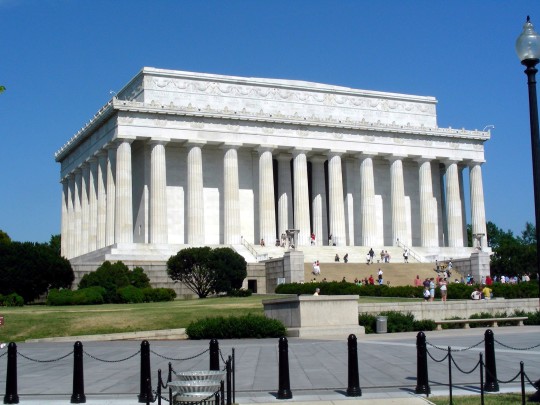
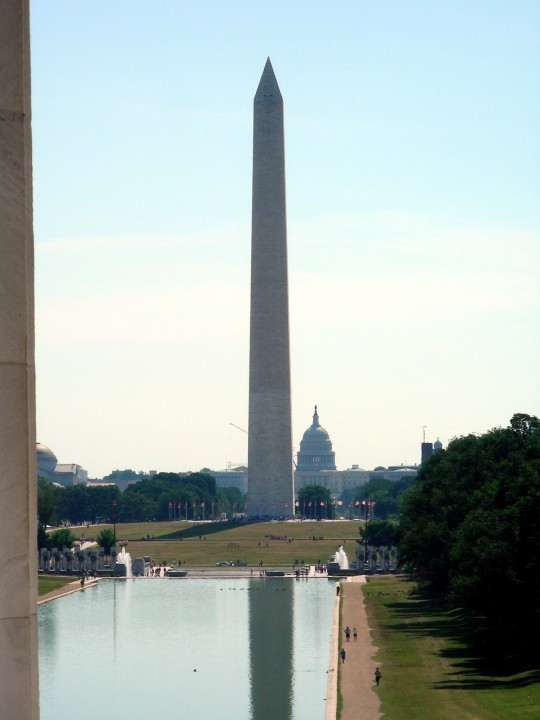

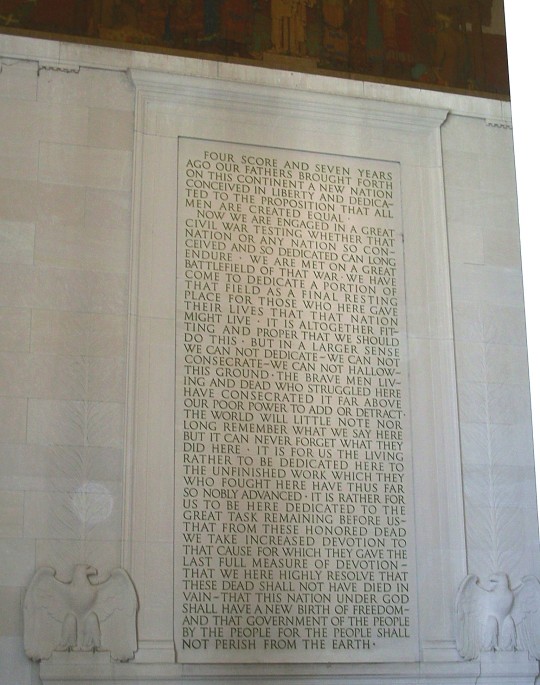

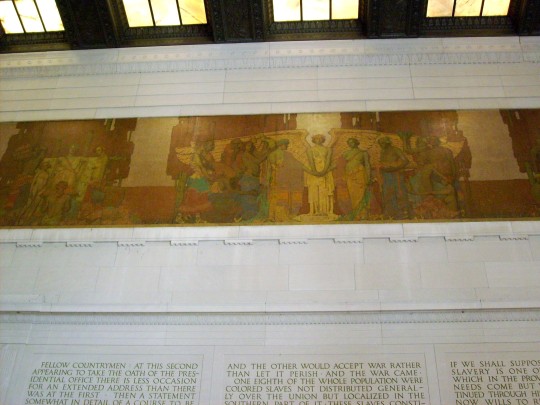

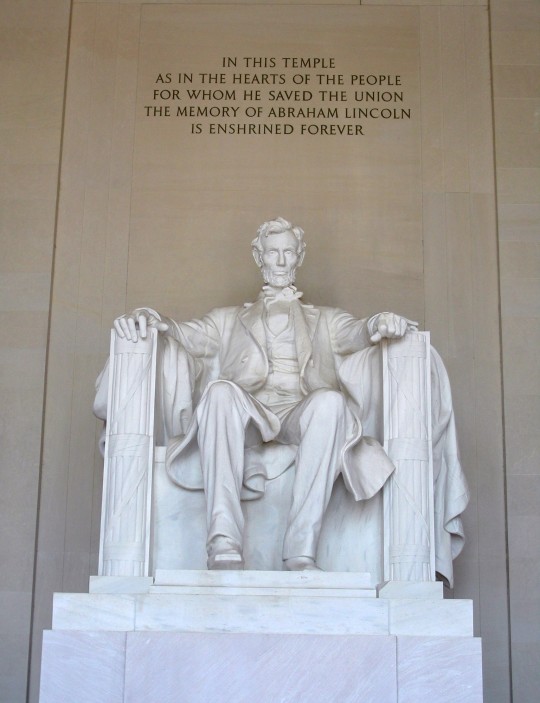

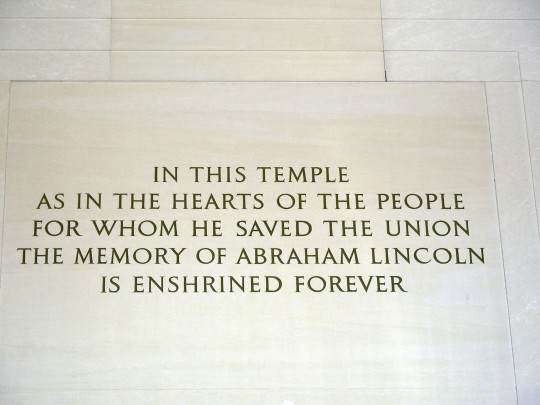
The Lincoln Memorial was dedicated in Washington, D.C. on May 30, 1922.
#Lincoln Memorial#Henry Bacon#Daniel Chester French#dedicated#travel#30 May 1922#100th anniversary#US history#Gettysburg Address#vacation#Washington DC#summer 2009#original photography#cityscape#architecture#sculpture#public art#Abraham Lincoln#16th US President#National Mall#Reflecting Pool#Washington Monument#US Capitol#inscription
2 notes
·
View notes
Text
The Gettysburg Address
On this date in 1863, Abraham Lincoln delivered the famous Gettysburg Address. 10 things you might not know about it:
0 notes
